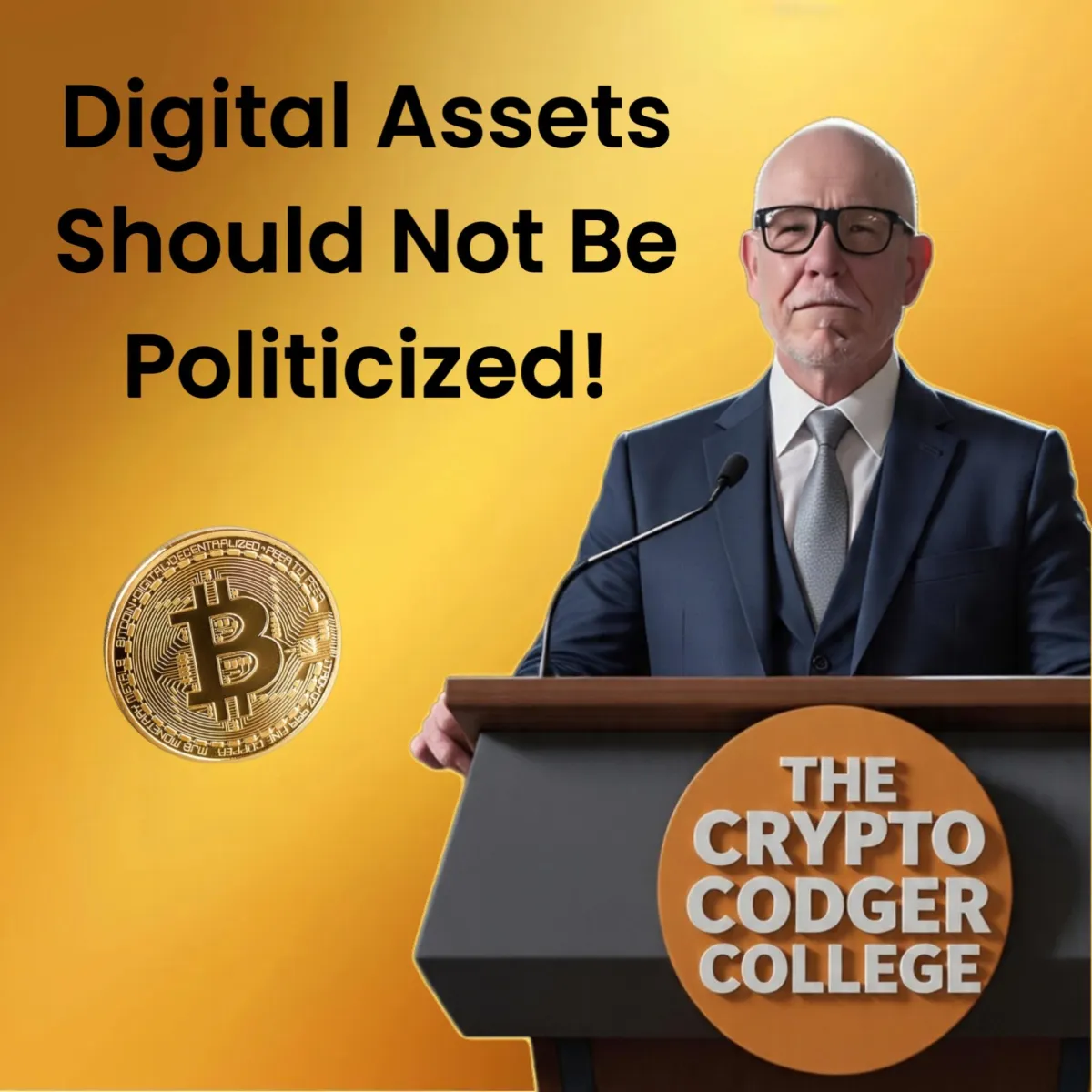
No Politics in Crypto!
Crypto Regulation at the Crossroads: Let’s Work Toward a Resilient and Independent Digital Asset Marketplace
Digital assets are no longer a niche experiment—they’re a global phenomenon. As they move into the financial mainstream, digital assets have become a battleground for political, economic, and ideological forces jockeying for control of the next evolution in money and markets. The result? Regulation that is often reactive, fragmented, politicized, and rife with vested interests—an environment that stifles innovation, rewards opportunists, and leaves ordinary users exposed to real risks.
It’s time to move beyond platitudes and wishful thinking about self-regulation. If we want a digital asset market that’s robust, transparent, and genuinely independent, we need regulatory frameworks that are clear, neutral, and built to withstand political volatility—not frameworks twisted by those seeking to capture or cripple the sector for their own agendas.
The Political Theater of Crypto Regulation
Let’s not sugarcoat the situation. In the United States and abroad, digital assets have become a highly politicized issue. Regulation often swings like a pendulum—libertarian optimism under one leadership, strict paternalism under the next. Crypto has become campaign fodder, lobbyist catnip, and, for some, a tool for quiet self-enrichment.
This politicization creates uncertainty at every level:
· Investors hesitate, innovation stalls, and users are left to navigate a regulatory “patchwork quilt” that shifts with election cycles.
· Lawmakers with undisclosed digital asset holdings craft policies that could personally benefit them, raising the threat of regulatory capture and public mistrust.
· Internationally, countries pursuing digital asset strategies for national prestige or sudden relevance may undermine global standards, giving rise to regulatory arbitrage and questionable actors.
Why Apolitical Regulation is Essential
This chaotic regime doesn’t protect people—it limits honest innovation while enabling well-connected insiders and fraudsters. Robust, apolitical regulation is not an enemy of progress, but its ally. Clear, even-handed rules enable good actors to thrive, bad actors to be held accountable, and ordinary participants to operate with confidence and trust.
Here’s what that means in practice:
· Technology-neutral policy: Don’t legislate against (or in favor of) one technology over another. Regulate conduct, not code. Smart laws target outcomes, not innovation.
· Independent oversight: Lawmakers and regulators must be subject to real transparency and barred from industry self-dealing. Financial disclosure of crypto holdings should be mandatory.
· National—and international—coordination: Discard the Balkanized mess of state-by-state rules. Move toward uniform national frameworks, and work internationally to prevent a race to the regulatory bottom.
· Public interest at the center: Regulations must be written from the standpoint of protecting users, ensuring fair access, and reducing systemic risk—not entrenching incumbents or rewarding political donors.
The Hard Work Ahead
Depoliticizing digital assets isn’t about hosting roundtables and hoping for consensus. It’s about transparency, enforcement, and sustained public pressure.
· Insist that all regulatory deliberations are open, with draft proposals subject to independent review and public comment—not just crypto industry lobbying.
· Demand that policymakers separate their personal financial interests from their public duties—mandatory disclosures, cooling-off periods, and bans on industry employment while in office.
· Build education and research coalitions that empower voters and users to parse the difference between meaningful regulation and opportunistic headline-chasing.
· Embrace international cooperation. Crypto is borderless; rules that work must be too.
A Vision Worth Fighting For
A truly independent digital asset marketplace—one that values creativity, fairness, and real security—will only emerge if we demand tough, principled guardrails. Well-crafted regulation is how we protect the roots of innovation without choking off the branches.
Real progress depends on more than warm words about “freedom” or “the future.” It requires engaging with the hard realities: financial systems are always political, and new technology will always attract both idealists and opportunists. The challenge is not whether to regulate, but how.
We should not settle for regulatory capture by insiders or empty gestures that favor only the most powerful players. Nor should we let inertia or partisanship hamstring a technology with global potential. We need a generation of policy that is open, challenging, and immune to short-term political cycles, built on transparency and designed to serve a public—and a marketplace—ready to step into the digital era with clear eyes.
For those building, investing, or learning: don’t just hope for a better environment—fight for it. Demand integrity, clarity, and independence in the rules that will shape crypto for decades to come.
The real “revolution” in digital assets won’t be the next killer app; it will be the establishment of trust, transparency, and genuine independence—values worth every bit of challenge they bring.
For more information about Digital Assets and how this stuff all works visit The Crypto Codger at https://www.thecryptocodger.com